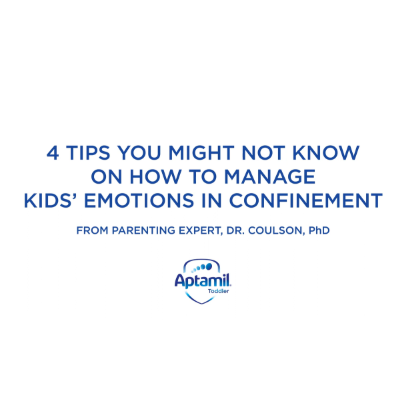- We all have three basic psychological needs: relatedness, competence and autonomy
- If we can name feelings, we can tame them
- Use language that builds intrinsic empathy rather than criticising or praising
The power of positive language on our children

Key points
Dr Justin Coulson - Leading Parenting expert
While it is important that our children hear the word ‘no’ at times, we don’t want to fall into the trap of only focusing on unwanted behaviour. It seems as though when we draw attention to what we don’t want – “No biting!”, for example – the brain hangs on to the ‘biting’ and forgets the ‘no’. We need to shift our focus to what we do want, and instead talk about being kind, gentle and helpful.
The 3 basic psychological needs
Researchers have demonstrated that humans have 3 basic psychological needs. The first is relatedness – for our relationships to be reciprocal, connected and loving. The second is competence – that we’re developing the capacity to increase our capabilities and effectiveness. The third is autonomy – the ability to have a level of control over our decisions and make our own choices.Our children prize these 3 needs above all else. As parents, our language choices have a tremendous impact on how our children learn. If parents are constantly critical or if our default is ‘no’, the relatedness need suffers. Our children feel like they’re not good enough or are always doing something wrong. Their competence suffers because they feel like they are incapable of achieving anything. And their autonomy suffers because ‘no’ takes away their ability to make decisions for themselves. They are constantly being controlled. We instead want to use language that fosters and enhances the development of these needs. We want to help our children feel connected to us, give them opportunities to learn competence, and allow them to willingly make decisions and develop autonomy to an extent that is developmentally appropriate. By doing this, we raise resilient children.
How to practise positive language
When our child is doing something we don’t like, remember that they’re not trying to be challenging, they are feeling challenged. Being critical or telling them to “calm down” or “stop it” ruptures the relatedness need, crushes the competence need and does nothing to augment the autonomy need. Instead, we need to recognise that our child is doing the best they know how. This reframes their behaviour. Instead of seeing our child as challenging, we see that they are experiencing a challenge. Big difference! It can be helpful to focus on our children’s emotions when they are struggling. One powerful way to do this is that we “name it to tame it”. This is where we move away from negative language – “Stop crying” – to something that recognises their emotions and offers a level of understanding. Find a way to say, or act with empathy, in a way your child might understand. Communicate: “You’re really struggling with this right now, aren’t you? I can see you are angry. You really wanted the green spoon, not the pink one, and that’s frustrating.” When we name it to tame it, we’re really saying that we understand and acknowledge what our child is going through. We’re not saying it’s OK, and we’re not endorsing it. We’re just saying we can see they are feeling big emotions. Often this is enough to calm our kids down when they’re being challenging, and it has the added benefit of showing them how to recognise and label their emotions, which helps build empathy.
Avoid overpraising
Praising is often mistaken for positive language, but it can actually undermine a child’s wellbeing. Constantly praising our children for doing everyday activities like sharing, running, eating, playing and sleeping can override their feelings of competence. They can start to think if you’re going to praise them for these things, they must be really bad at them. It’s the same thing that happens when we glorify vegetables to get our kids to like them. We say, “Oh goodness, this broccoli is amazing,” but they think if we need to sell it that hard, it must be the worst thing on the plate. Additionally, praise can override autonomy because it often feels manipulative. “Good sharing” or “great listening” might be sincere. But it might also be a parent’s way of manipulating a child. Studies show they can sense this – and they tend to resist such praise. What I recommend instead of praise is gratitude. Thank them for helpful behaviour. You can also build empathy by focusing on the things you want to encourage. For example, you could say, “I saw you sharing with your brother. How does it make him feel when you do that?” Moving your language away from external expressions of disallowed or approved behaviour and towards language that builds reinforcement from within, gives your child the scaffolding and support they need to form their own positive values and attributes.
Related pages

Get in touch with our Careline experts
When your little one is unhappy or unwell you want reliable support from a trusted source. Our Careline team of nutritionists, dietitians and midwives specialise in infant and child health, offering free nutrition, feeding and product information.



